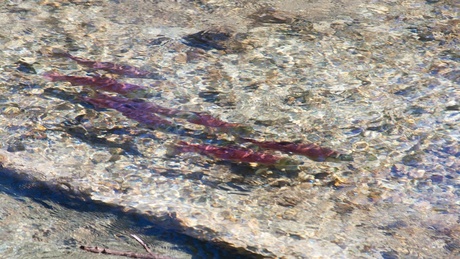forum
library
tutorial
contact

Will NOAA's New Process Matter?
by Editorial BoardThe Daily Astorian, December 17, 2012
|
the film forum library tutorial contact |

|
Will NOAA's New Process Matter?by Editorial BoardThe Daily Astorian, December 17, 2012 |
Stakeholder consensus may show divisions over salmon are shifting
 To borrow a metaphor from the Bible, it can seem easier to fit a hundred sea lions through the eye of a needle than it is to find regional agreement on wild salmon recovery efforts.
Such consensus is the goal of a new effort by the National Oceanic and Atmospheric Administration, the front-line agency in charge of bringing Northwest salmon and steelhead back from the brink of extinction.
To borrow a metaphor from the Bible, it can seem easier to fit a hundred sea lions through the eye of a needle than it is to find regional agreement on wild salmon recovery efforts.
Such consensus is the goal of a new effort by the National Oceanic and Atmospheric Administration, the front-line agency in charge of bringing Northwest salmon and steelhead back from the brink of extinction.
NOAA Fisheries is spending more than $200,000 with the Oregon Consensus program at Portland State University and the William D. Ruckelshaus Center in Washington state for interviews with about 200 stakeholders. A report will be produced about regional opinions on how best to proceed with the long slog toward viability for iconic species that were hammered flat.
Decades of recovery efforts have helped -- if at great uncertainty and expense. We have climbed back above the darkest days when doom appeared nearly certain for important runs such as Snake River spring and summer chinook.
Numbers still are nowhere near what they should be. A handful of bad years could easily undo all the progress made. An unstable climate and acidifying ocean, coupled with ongoing development in the Columbia River Basin, pose a profound ongoing challenge to species survival. It is smart to take the temperature of leadership opinion and see where we stand. News like the liberalization of marriage and marijuana laws in Washington state prove that deeply entrenched opinions do evolve over time. The same may be true of some of the divisions that have hobbled salmon-recovery efforts.
Consensus-based decision making has its pitfalls, however. For example, Gov. John Kitzhaber seems to have concluded there was a consensus for removing commercial fishing from the river. But his definition of consensus did not include seeking the agreement of those most affected -- commercial fishermen.
Unless they are well designed and led, such processes also are prone to becoming so watered down or long-winded as to be functionally meaningless.
Can NOAA's consensus process make a difference? Maybe. At a minimum, it can start doing a better job weaving together many uncoordinated efforts on the river's main stem and tributaries. In a broader sense, perhaps it can morph into a larger-scale direct negotiation among all parties so we can avoid costly lawsuits and spend scarce money more wisely.
As the Columbia River Inter-Tribal Fish Commission observed long ago, healthy salmon runs depend on healthy interlocking habitats for every wiggle of their life cycles. We should at least all be able to agree and cooperate on this much.
learn more on topics covered in the film
see the video
read the script
learn the songs
discussion forum
